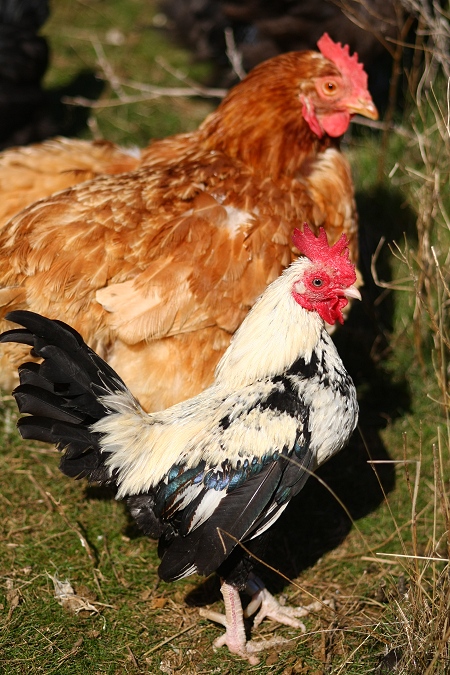This is something that's been blogged here before. Animal Place currently opposes the creation of ordinances permitting chickens. We support and will promote the adoption of chickens into homes where they are legal.
Back to the blog, a point I'd like to touch upon:
There is an assumption here that chickens people purchase from hatcheries and feed stores are somehow intended for egg farms. They aren't. There are hatcheries that produce hens for the egg-laying industry. A recent example is Hy-Line hatchery, the world's largest producer of hens for the egg industry and embryos for vaccines. They also grind up all male chicks alive, which isn't something hatcheries producing chicks for backyard flocks do - chicken sexing is difficult and roosters make great packing material.But isn't a life in a backyard with a concerned, if novice, family better than being debeaked, forced to molt and jammed into a tiny factory farm cage for your entire existence? And isn't a short life in that backyard better for a rooster than being liquidized in a grinder as a chick?
As to roosters, the author fails to realize that it takes 4-6 months for purchasers to know gender. That's 4-6 months of children bonding with an engaging little bird, 4-6 months of Mary Sue naming, grooming, feeding and adoring her feathered friend. I cannot tell you how many calls we've received of crying mothers, sobbing chicken guardians who so desperately want to save their companion bird's life. When the gender is known, that rooster is suddenly taken from all that he has known, shuffled into a cold cage at the local shelter and, if he is lucky, he is euthanized properly by qualified staff.
The blog ignores entirely the valid issues the sanctuaries brought up. Nowhere does the author mention that day-old baby animals are shipped through the postal service without food for up to 72-hours legally. The author doesn't mention that hatcheries use roosters as packing material, you know, like bubble wrapper or newspaper, and then those same hatcheries refuse to take back the roosters. The author doesn't mention the increased intake shelters and sanctuaries have seen of unwanted hens and roosters, the difficulty in placing chickens, and the extra burden this places on animal shelters and sanctuaries.
The author doesn't mention that chickens are not uber-easy-throw-out-in-the-backyard pets. Their medical care is expensive. They are carriers of normal chicken diseases that people cringe at hearing - salmonella, coccidia, giardia. They attract rodents and predators, which can be prevented with proper predator proofing and extra care in storing food. The author doesn't mention that chickens are not food, they are unique individuals with interesting personalities. Goodness forbid, they are viewed as companion animals and, as such, be offered the kind of treatment a good guardian would provide to their dog or cat.
Animal Place will be opening Rescue Ranch sometime in 2010. It will serve as an innovative animal adoption and placement center. The focus will be farmed animals, especially chickens. Our goal will be to legally rescue hens from cooperating egg farms and place those caged and bedraggled hens into homes where they can run free, scratch in the dirt, sun-bathe, you know - be a chicken. We'll work tirelessly with shelters to place needy hens in homes and also focus on networking homes for the most neglected, the roosters. There are too many being slaughtered, too many being killed in shelters, too many being purchased and dumped. We want to see more hens and roosters adopted into good homes.
But we cannot, in good conscience, support opening the flood-gates for more abused and unwanted birds. Not until the regions where chickens ARE legal show they can significantly reduce the rate of unwanted hens and roosters, ensure birds are not slaughtered in backyards, and where most birds are adopted from organizations like Animal Place and not purchased from hi-volume, puppy-mill style hatcheries. And we certainly cannot support more ordinances when the perception of chickens is as food source and not companion. We want people to like chickens, relate to them as they would a companion dog or cat. We want people to revel in the daily gossip of the chickens. We want people to make that connection, between their companion chicken and the chicken wrapped in plastic at the supermarket - they are one in the same, an animal with unique interests, a drive to live.
If you are truly, honestly interested in welcoming chickens into your life as companions and friends, not as food sources, wonderful. Find out if it is legal where you live by contacting your planning department or local shelter. Research how to build a predator-proof chicken coop. Meet with neighbors, ask for input, answer questions and concerns. Remember, unhappy neighbors can lead to conflicts and problems. Make sure your fencing is tall and secure, able to prohibit access from raccoons, dogs, dangerous humans, wild cats, coyotes. Research the dietary needs of chickens - some breeds do poorly on a cobb-based diet, others do fine. Most love fresh produce. Learn where your local avian veterinarian is and find out how much a visit costs. Learn about the common diseases and health concerns with birds and how to prevent them.Make sure if you live in a cold-region you can keep the chickens warm.
And if you want to be put on a waiting list for incoming hens or roosters, or when Rescue Ranch is up and running - contact us at info@animalplace.org. We get calls frequently on needy chickens, especially roosters, so if you can legally provide a good, safe home for one, let us know. Please do not buy from hatcheries or feed stores. Please call us or your local shelter first and adopt. If you have questions on caring for chickens, email us as well - we're happy to help. With a flock of more than 100 chickens and turkeys and decades worth of experience handling birds, it's safe to say we've got a bit of expertise on the matter. :)
ETA: I think the commenters over at The Oil Drum offer up reasons aplenty for not allowing more ordinances.










1 comments:
Well said.
We're working on buying a new piece of property, and it's going to be totally outfitted for larger numbers of rescued birds. So once we get settled in 6 months or a year, you will definitely be hearing from me. Over the course of a few years, I'm hoping to work my way up to maybe 50 birds. :-)
Post a Comment